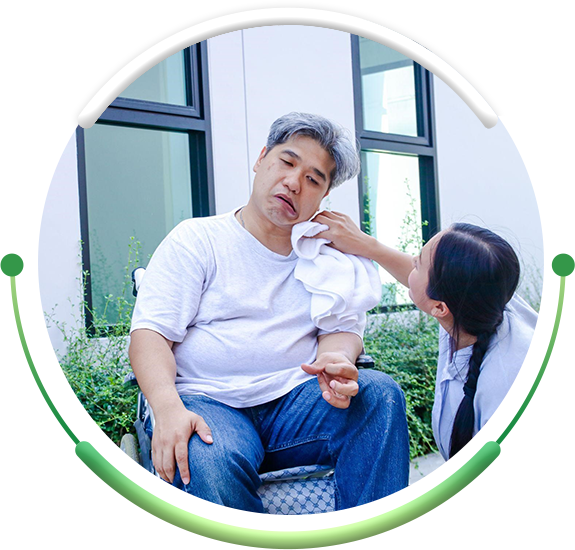Paralysis

Paralysis
What Causes paralysis?
It can occur for many reasons. These symptoms may develop as a result of trauma or accidents, as well as congenital disabilities. Here are some reasons that will help you recognise the condition of paralysis. The main cause of paralysis include:
- Stroke: A stroke can result in one side of the body due to a blockage or rupture of blood arteries in the brain.
- Spinal cord injury (SCI): When the spinal cord is injured, it can cause paralysis, most often affecting the lower extremity of the injury.
- It is caused by the presence of a tumour in the brain or spinal cord, which has the potential to crush nerves.
- Infections/Viruses: Some viruses, such as West Nile virus and polio, because they damage the nervous system.
- Congenital conditions: Some people are born with diseases like cerebral palsy or spina bifida that cause paralysis.
In summary, there are multiple rheumatoid arthritis causes that contribute to its development.
Signs and symptoms of paralysis
Paralysis symptoms vary depending on the type. It can be recognised very easily. And it can happen to anyone at any time. Therefore, both children and adults can experience paralysis attack symptoms.
- Breathing difficulties: In severe situations, paralysis of the breathing muscles may result in respiratory issues.
- Pain or discomfort: Pain or discomfort occurs when injury to the spinal cord causes this condition.
- Muscle weakness: When it occurs, weakness or looseness is seen in the affected muscles in the body.
- Decreased movement: In this condition, the affected muscles cannot move freely.
- Loss of sensation: In this condition, there is numbness or a lack of ability to feel sensation in the affected area.
- Fatigue and general malaise- This can make daily activities more challenging and impact the overall quality of life.
- Morning stiffness- It can last hours and make moving difficult in the morning.
- Inflammation- It can affect other organs in the body, leading to complications such as lung inflammation, heart problems, and eye issues.
- Low appetite and weight loss- These are due to the body’s inflammatory response.
- Warmth or heat in the affected joints- This is due to inflammation and high blood flow.
- Flu-like symptoms- Fever, muscle aches, and weakness.
- Emotional and psychological factors- This includes depression and anxiety due to the chronic pain and limitations it can impose on daily life.
- Unusual symptoms of rheumatoid arthritis- It includes hearing problems, snoring, skin rash, gum disease, and digestion problems.
Types of paralysis
Monoplegia
This type of paralysis affects only one part of your body, such as an arm or leg. People suffering from this usually maintain control over the rest of their body, but they do not have control over the affected part.
Causes of Monoplegia:
- Strokes
- Tumour
- Brain injuries
- Nerve impingement
Paraplegia
Paraplegia paralyses the lower half of the body, including both legs and possibly parts of the torso. The patient cannot walk or make any movement in the lower part, nor can he feel anything.
Cause of Paraplegia
- Brain tumours
- Brain infections
- Spinal cord lesions
- Spinal cord infections
Hemiplegia
Hemiplegia results in the arms and legs on one side of the body. This may sometimes be temporary. The prognosis of the disease depends on the treatment. Causes of Hemiplegia
- Brain injuries
- Neurological
- Cerebral palsy
- Spinal cord injuries
Quadriplegia
It is below the neck and is called quadriplegia or Tetraplegia. Typically, the trunk and all four limbs are affected. Similar to paraplegia, individuals may experience varying degrees of disability and loss of function.
Cause of Paraplegia
- Alcohol overdoses
- Congenital abnormalities
- Allergic reactions to drugs
- Spinal and brain infections
Tips to Prevent Paralysis
By making some changes in your daily routine, you can avoid your condition or prevent it from happening.
- Eat a balanced diet.
- Maintain blood pressure.
- Regular exercise can help you stay healthy.
- Limit the amount of salt in your diet to 1,500 mg per day.
- If you smoke regularly, quit. This may worsen your problem.
- Avoid high-cholesterol foods like burgers, cheese and ice cream.
- Get an annual checkup to detect early signs of paralysis or any disease.
- Keep your weight at the recommended level for your height, age and gender.
In case of paralysis, it becomes very challenging for the patient to chew and digest his food, which is why it is advised to give food to the patient as per the prescribed conditions.
Homeopathic diet for paralysis patients
Considering the patient’s condition in the initial stage, the doctor advises him to give only a liquid diet. There is no other option because the patients cannot initially digest even the liquid diet properly. Sometimes, the liquid even goes into the respiratory tract, which causes a cough. You can give the mentioned diet to the patient in liquid form.
- Lentil water, Vegetable soup, Boiled gram water
When the patient’s condition improves slightly.
- Grind the roti well in a mixer, soak it in liquid and feed it little by little.
What is the best treatment for paralysis?
Without fully determining the symptoms of the disease, any diagnosis is inadequate. That is why the best paralysis doctor at Bharat Homeopathy Hospital thoroughly examines your paralysis symptoms. Only after this the paralysis treatment starts. One of the most common indicators of paralysis is loss of muscle mobility. Thus, homeopathic physicians can determine paralysis in patients suffering from spinal cord damage or stroke. paralysis treatment in homeopathic is a highly successful therapy, which involves a comprehensive approach to treating people. Homeopathic medicines (made from natural herbs and are side-effect-free) treat the root causes of paralysis. The patient is provided with customised medicines individually prepared for each patient.
Why Choose Kaushik Homeopathy?

Natural Treatment

Rapid Outcomes

Personalized Diet

